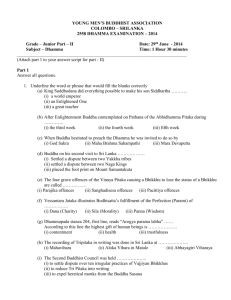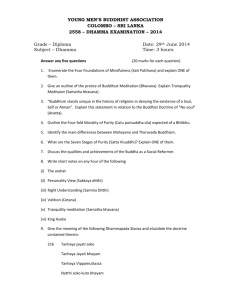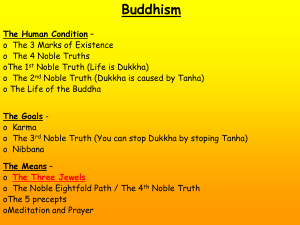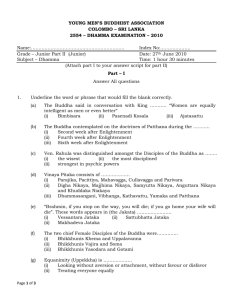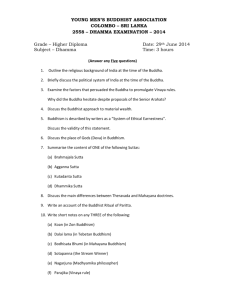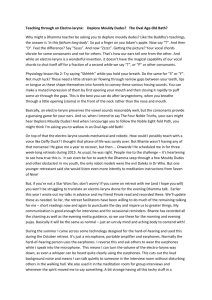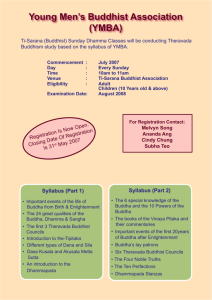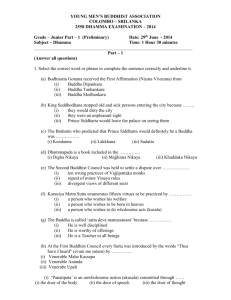M1-Dhamma-tj3
advertisement
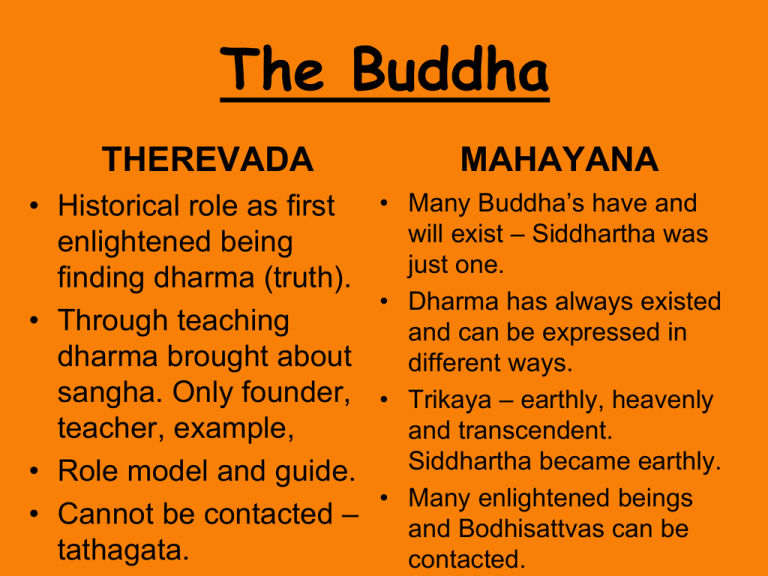
The Buddha THEREVADA • Historical role as first enlightened being finding dharma (truth). • Through teaching dharma brought about sangha. Only founder, teacher, example, • Role model and guide. • Cannot be contacted – tathagata. MAHAYANA • Many Buddha’s have and will exist – Siddhartha was just one. • Dharma has always existed and can be expressed in different ways. • Trikaya – earthly, heavenly and transcendent. Siddhartha became earthly. • Many enlightened beings and Bodhisattvas can be contacted. Theravada & Mahayana... In what different ways do Buddhists think of the Buddha? Think about it • Why is the Buddha still relevant to Buddhists today? • How important is the Buddha in the lives of Buddhists? • What are the benefits and difficulties for Buddhists in taking refuge in the Buddha? • Is the Buddha the most important of the Three Jewels? 26min number off 1-3 a) Describe the key events in the life of the Buddha. 6KU b) [ You will need to mention Theravada and Mahayana ] 1. Why might Buddhists believe that the Buddha is still relevant today? 10AE 2. How important is the Buddha in the lives of Buddhists? 10AE 3. What are the benefits and difficulties for Buddhists in taking refuge in the Buddha? 10AE Higher RMPS Buddhism the ‘Dhamma’ Learning intentions: • To understand what the Dhamma represents • To understand Therevada and Mahayana views about the Dhamma Success Criteria: I can… • Describe what Buddhists understand by ‘taking refuge’ and how they take refuge in the Dhamma. • Describe what the Dhamma is. • Explain the significance of the Dhamma to Buddhists. • Explain Therevada and Mahayana understandings of the Dhamma. A-B-C Which is not a definition of ‘Dhamma’? A. B. C. D. E. Truth Teachings Path Way Buddhism The Dhamma The truth. Not the source of enlightenment but indicating the way. The Dhamma Why is Dhamma refuge? – Written record of Buddha’s teaching (Buddha taught orally only) – Collection of teachings – includes other sources too from Arhats and Bodhisattvas. – Way of life... Not just words, but actions, beliefs, how you speak, how you think etc… – Not a destination, but a way of reaching enlightenment The Dhamma – Way of life... Not just words, but actions, beliefs, how you speak, how you think etc.. – Every moral choice you make has good or bad Karmic consequences (remember ‘Bija’?) – The Dhamma can be thought of as the ‘middle way’ (or path) that leads to enlightenment Work in pairs… Describe the Dhamma. The Dhamma Not a source of enlightenment in and of itself – analogy with a path to a mountain, a raft to cross a river, a bridge to cross a gorge. All ways of helping to reach nirvana. The Buddha’s finger pointing to the moon... The Dhamma: Therevada Dhamma is understood as only the teachings of historical Buddha. They stick very closely to the traditional accounts and claim the teachings are accurate as passed on by Buddha as the 3 baskets, or the Tripitaka: 1. Vinaya pitaka – ‘rules’ 2. Sutta pitaka – explanations of teachings 3. AbhiDhamma pitaka - philosophy The Dhamma: Mahayana • Also accept the tripitaka, but accept teachings from other sources too. Think back to one of the Buddhists first teachings – what works for you... • Dhamma IS NOT SACRED SCRIPTURE. It is not worshipped or treated as holy or followed slavishly. It only indicates the way. RANK ‘em! Rank the following in terms of the best to worst actions for a Buddhist to do: A. B. C. D. E. Falsely claim to be enlightened Smoke a cigarette Kill a fly Eat meat Have sex Tripitaka: Vinaya pitaka • Rules and guidelines for monastics. Remember though no moral absolutes, rather kusala and akusala. • Includes ‘punishments’ and is mainly concerned with physical actions e.g. sex, drugs, negative thoughts, vanity etc. http://www.accesstoinsight.org/tipitaka/vin/index.html • Examples of actions which lead to expulsions or ‘defeat’: sexual intercourse, theft, taking of life, false claims of enlightenment. Confession is a significant element and expectation in Buddhism. Tripitaka: Sutta pitaka • Elaborations on teachings of the Buddha (by the Buddha). • Use of analogies etc. http://www.accesstoinsight.org/tipitaka/sutta.html • What is the following describing? “Wise people, after they have listened to the dhamma, become serene, like a deep, smooth and still lake” (Dhammapada 82) “How you should behave in life is sometimes very difficult to work out. Deciding what’s right and what’s wrong can throw you into turbulent confusion. Follow the Dhamma and this confusion will settle be still” Tripitaka: AbhiDhamma pitaka • Theoretical rather than practical – focus on philosophy of teachings. http://www.accesstoinsight.org/tipitaka/abhi/index.html Symbol it! Draw 3 symbols to represent the Tripitaka. As a class, rank the symbols… The Dhamma Fill the boxes with THEREVADA MAHAYANA their views please… • Dhamma comes from historical Buddha - lineage. • Discovered through his own efforts and taught to first sangha then passed orally for 500 years. • Many sources accepted as Dhamma - requires no lineage as Dhamma is truth. • Dhamma has always existed and taught by enlightened beings throughout The Dhamma THEREVADA MAHAYANA • Dhamma comes from historical Buddha - lineage. • Discovered through his own efforts and taught to first sangha then passed orally for 500 years. • Many sources accepted as Dhamma - requires no lineage as Dhamma is truth. • Dhamma has always existed and taught by enlightened beings throughout history. In your jotters… 1. Describe what Buddhists understand by ‘taking refuge’ and how they take refuge in the Dhamma. 2. Describe what the Dhamma is. 3. Explain the significance of the Dhamma to Buddhists. 4. Explain Therevada and Mahayana understandings of the Dhamma.
